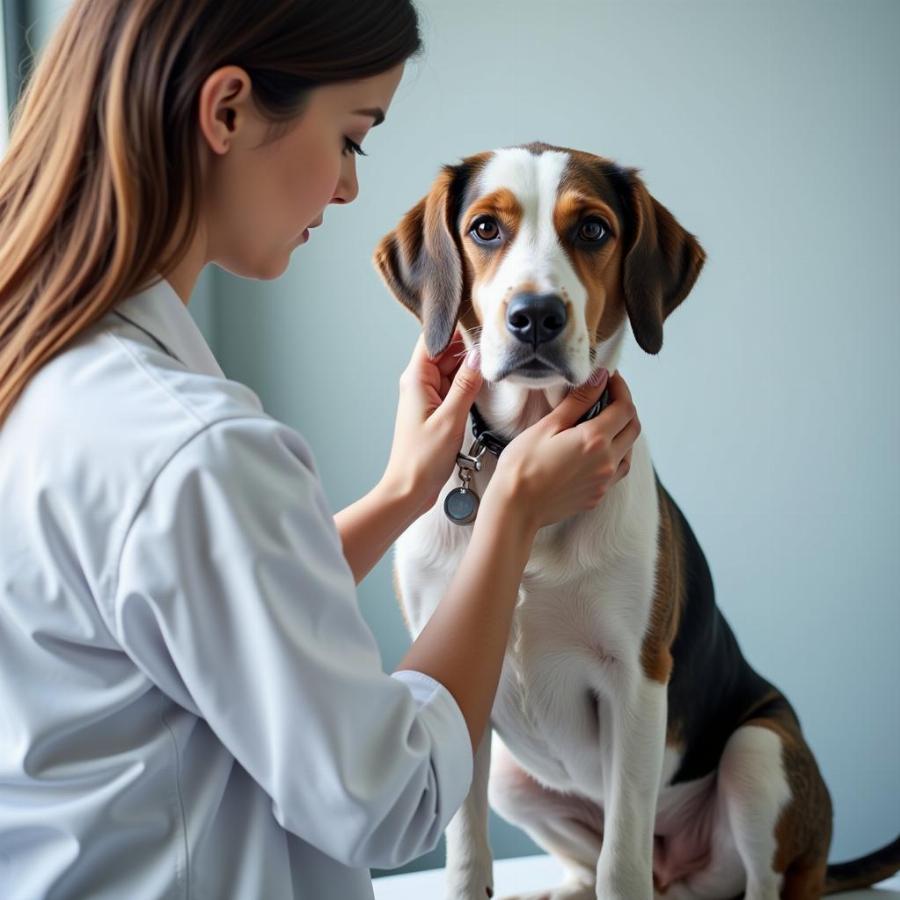Noticing blood coming from your dog’s behind can be alarming. While some causes are benign and easily treatable, others can indicate a more serious condition. This comprehensive guide will walk you through the potential reasons for dog bum bleeding, available treatment options, and when it’s crucial to seek immediate veterinary care.
Understanding the Causes of Bleeding
Several factors can contribute to bleeding from a dog’s bum. Identifying the underlying cause is essential for determining the appropriate course of treatment. Here are some common culprits:
Anal Gland Problems
Anal glands, located near your dog’s rectum, secrete a foul-smelling fluid that aids in scent marking. These glands can become impacted, infected, or abscessed, leading to discomfort and bleeding.
Signs your dog may have anal gland issues:
- Scooting or dragging their bottom along the ground
- Excessive licking or biting at their rear end
- A foul odor emanating from the anal area
- Swelling or redness around the anus
Dietary Indiscretion
Dogs are notorious scavengers, and sometimes their curiosity leads them to ingest things they shouldn’t. Eating foreign objects, spoiled food, or even bones can irritate the digestive tract and cause bleeding from the rectum.
Signs your dog may have eaten something they shouldn’t have:
- Vomiting
- Diarrhea
- Loss of appetite
- Lethargy
Parasites
Intestinal parasites, such as hookworms, whipworms, and roundworms, can cause irritation and inflammation in your dog’s digestive system. This can lead to bleeding, often appearing as streaks of blood in their stool.
Infections
Viral, bacterial, or parasitic infections can affect a dog’s digestive system, causing inflammation and bleeding.
Signs of a potential infection:
- Fever
- Lethargy
- Loss of appetite
- Vomiting
- Diarrhea
Tumors or Polyps
Growths in the rectum or anal area, whether benign or cancerous, can bleed, especially if irritated.
Other Causes
Other potential causes of dog bum bleeding include:
- Stress
- Allergies
- Colitis
- Certain medications
Treatment Options
Treatment for dog bum bleeding varies depending on the underlying cause.
- Anal Gland Issues: Your veterinarian can manually express the glands or prescribe medication to address infections or abscesses.
- Dietary Indiscretion: Treatment may involve inducing vomiting, administering activated charcoal, or providing supportive care depending on the severity of the situation.
- Parasites: Your veterinarian will recommend deworming medication to eliminate the parasites.
- Infections: Treatment typically involves antibiotics or other medications to address the underlying infection.
- Tumors or Polyps: Treatment options for tumors or polyps may include surgery, chemotherapy, or radiation therapy.
When to See a Veterinarian
While not all cases of dog bum bleeding warrant an immediate trip to the vet, it’s crucial to seek professional help if:
- The bleeding is heavy or persistent.
- Your dog exhibits other concerning symptoms like lethargy, vomiting, loss of appetite, or diarrhea.
- You suspect your dog may have ingested a foreign object.
- You notice a foul odor or swelling around your dog’s anus.
 Veterinarian examining a dog
Veterinarian examining a dog
Preventing Future Problems
Here are some proactive measures to help prevent future instances of dog bum bleeding:
- Feed your dog a high-quality diet and avoid giving them table scraps.
- Regularly check your dog’s stool for signs of parasites.
- Keep your dog up-to-date on their deworming medication.
- Have your veterinarian express your dog’s anal glands regularly, especially if they are prone to issues.
- Prevent your dog from scavenging or eating things they shouldn’t.
Beaut Dogs: Your Trusted Source for Canine Information
Beaut Dogs is your one-stop resource for reliable and informative content on all things dog-related. We are committed to providing dog owners with the knowledge and tools they need to care for their furry companions. For personalized advice and support regarding your dog’s health, please don’t hesitate to contact us at [email protected]. Beaut Dogs is here to help you navigate the wonderful world of dog ownership!